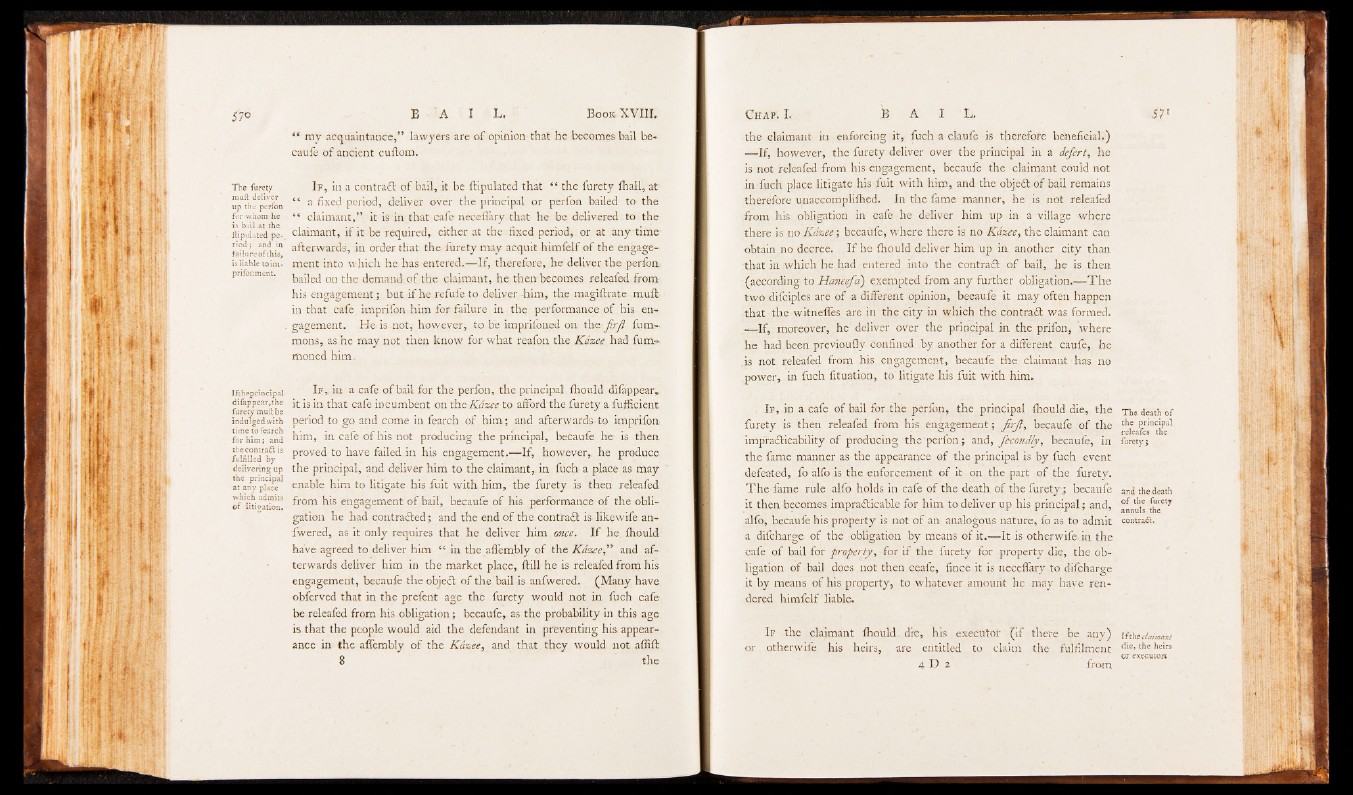
The furety
mult deliver
up the perfon
for whom he
is bail at the
llipulated pe-_
riod; and in
failure of this,
is liable to im -
prifonment.
Iftheprincipal
difappear,the
furety mull be
indulged with
time to fearch
for him; and
the contrafl is
fulfilled by
delivering up
the principal
at any place
which admits
o f litigation.
“ my acquaintance,” lawyers are of opinion that he becomes bail be-
c-aufe of ancient cuftom.
If , in a contrail of bail, it be ftipulated that “ thefurety fhall, at
“ a fixed period, deliver over the principal or perfon bailed to the
“ claimant,” it is in that cafe neceflary that he be delivered to the
claimant, if it be required, either at the fixed period, or at any time
afterwards, in order that the furety may acquit himfelf of the engagement
into which he has entered.— If, therefore, he deliver the perfon
bailed on the demand of the claimant, he then'becomes releafed from
his engagement; but ifherefufeto deliver-him, the magiftrate muft
in that cafe impiifon him for failure in the performance of his engagement.
He is not, however, to be imprifoned on the-Jirfi fum-
mons, as he may not then know for what reafon the Kdzee. had fum-
rfioned him,
If , in a cafe of bail for the perfon, the principal fhould difappear^
it is in-that cafe incumbent on the Kdzeeto afford the furety a fufficient
period to go and come in fearch of him; and afterwards-to imprifon-
him, in cafe of his not producing the principal, becaufe he is then
proved to have failed in his engagement.— If, however, he produce
the principal, and deliver him to the claimant, in fuch a place as may
enable him to litigate his fuit with him, the furety is then releafed
from his engagement of bail, becaufe of his performance of the obligation
he had contracted; and the end of the contract is likewife an-
fwered, as it only requires that he deliver him once. I f he. fhould
have agreed to deliver him “ in the aflembly of the Kazee ” and afterwards
deliver him in the market place, flill he is releafed from his
engagement, becaufe the objedt of the bail is anfwered.. (Many have
obferved that in the prefent age the furety would not in fuch cafe
be releafed from his obligation; becaufe, as the probability in this age
is that the people would aid the defendant in preventing his appearance
in the aflembly of the Kdzee, and that they would not affifl
8 the
the claimant in enforcing it, fuch a claufe is therefore beneficial.)
— If, however, the furety deliver over the principal in a defert, he
is not releafed from his* engagement, becaufe the claimant could not
in fuch place litigate his fuit with him, and the objedl of bail remains
therefore unaccomplifhed. In the fame manner, he is not releafed
from his. obligation in cafe he deliver him up in a village where
there is no Kdzee; becaufe, where there is no Kdzee, the claimant can
obtain no decree. I f he fhould deliver him up in another city' than
that in which he had entered into the contradl of bail, he is then
(according to Haneefa) exempted from any further obligation.— The
two difciples are of a different opinion, becaufe it may often happen
that the witnefles are in the city in which the contract was formed,
— If, moreover, he deliver oyer the principal in the prifon, where
he had been previoufly confined by another, for a different caufe, he
is not releafed from his engagement, becaufe the claimant has no
power, in fuch fituation, to litigate his fuit with him.
If , in a cafe of bail for the perfon, the principal fhould die, the
furety is then releafed from his engagement; JirJl, becaufe of the
impradlicability of producing the'perfon; and, fecondly, becaufe, in
the fame manner as the appearance of the principal is by fuch event
defeated, fb alfo is the enforcement of it on the part of the furety.
T h e fame, rule alfo holds in cafe of the death, of the furety,; becaufe
it then becomes impracticable for him to deliver up his principal; and,
alfo, becaufe his property is not of an analogous nature, fo as to admit
a difcharge of the -obligation by means of it.— It is otherwife.in the
cafe of bail for property, for if the furety for property die, the obligation
of bail does not then ceafe, fince it is neceflary to difcharge
it by means of his property, to whatever amount he may have rendered
himfelf1 liable.
If the claimant fhould. die, his executor (if there be any)
or otherwife his heirs, are entitled to claim, the fulfilment
4 D 2 - from
The death o f
the principal
■ releafes the
furety ;
and the death
o f the furety
annuls the
contract.
I f the claimant
die, the heirs
or executors